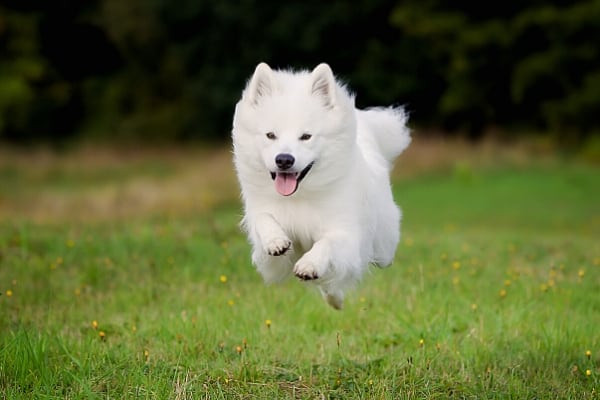Samoyeds are a rare balance between majestic and playfully adorable.
With the lush, robust coat, sturdy frame, and smiling face, these dogs are real showstoppers, but how much do Samoyeds cost, and how much can you expect to pay for their upkeep throughout their lives?
How much do Samoyeds cost? Samoyeds cost between $1,600 and $2,500. The price you pay will depend on whether the dog that you’re buying has show potential and whether you plan to breed. Health clearances obtained, age, quality of the coat, and size will also affect the cost.
Read on to view actual breeder prices and to learn what goes into the cost of your dog. You will also discover how to choose a great breeder and what other costs may be associated with Samoyed ownership.
Actual Samoyed Prices
Breeder |
Price |
Location |
| White Eagle’s Way | $2,500 | Ohio |
| Smitty’s Samoyeds | $2,500 | Michigan |
| Trails End Samoyeds | $1,600 – limited registration, $2,400 – full rights | Wisconsin |
What Can Affect the Cost?
Samoyeds are not as common as some other dog breeds, especially in America. They rank 59 out of 195 in popularity, according to American Kennel Club rankings.
This relative rarity means that Samoyeds may tend to be a bit more expensive than other breeds.
On the other hand, Samoyeds are relatively healthy dogs and not exceptionally difficult for breeders to keep, which keeps the price down somewhat.
That said, here are the variables that can affect the cost of your Samoyed.
Limited Registration or Right to Show and Breed
You may pay up to twice as much for a dog whom you have the right to show and breed. Not all breeders will sell potential show dogs or give breeding rights.
Often breeders sell show dogs on a limited contract basis. The breeder may retain the right to show or breed the dog while you enjoy him or her as a family pet.
This can be a great way to get a wonderful, stunning family pet at a reasonable cost.
Coat
One of the great assets of a Samoyed is the lush, beautiful coat.
Puppies who don’t show a good coat or older dogs who haven’t developed a strong coat may be less expensive than dogs with ideal, plush coats.
Coats should be pure white. Cream coloration or tan areas will lower a dog’s price.
Age
You’ll be able to buy an older Samoyed for less than the cost of a puppy.
While these are certainly not one of the dog breeds most often rehomed, they are beautiful dogs with sweet smiles that sometimes encourage poorly planned, spontaneous purchases.
You may be able to find an older dog who is being rehomed by an owner or breeder at a reduced rate.
Size
Samoyeds vary more in size than some other breeds. Breeders are bound to have preferences in terms of size due to the allowance of size fluctuation in the breed standard.
Males can range from 45 to 65 pounds, and females can be between 35 and 50 pounds.
Dogs likely to be larger or smaller may cost more or less, depending on the breeder. Dogs who exceed or do not reach size expectations may also be rehomed.
Finding a Good Breeder
A great Samoyed breeder should be an enthusiast for the breed. They should know the breed’s history and understand what makes them so special.
A great breeder should be excited to show you their dogs.
They may not allow you around young puppies or mothers, but they should be happy to show you their other dogs.
Here are some other things to look for in a great Samoyed breeder.
Live With Their Dogs
These perpetually smiling, majestically beautiful dogs were bred for work and human engagement. Your breeder should respect this dog’s history of close relationships with their human.
These dogs didn’t just pull the sleds of humans; they shared their tents and kept them warm through Siberian nights as cold as minus 60 degrees.
Your breeder’s Samoyeds should live with people, as they have throughout their history, not in isolated outdoor confinement.
Perform health tests
Samoyeds are generally healthy dogs, but they do suffer from some important health concerns. Breeders should test their breeding dogs for these potential problems.
These are the tests recommended by the Samoyed Club of America.
- Eye exam – should be performed by an ACVO ophthalmologist on dogs over 1 year old. Results should be registered with the Orthopedic Foundation for Animals (OFA).
- Hip dysplasia – evaluation should be completed by the OFA, the Ontario Veterinary College Hip Certification Program (OVC), or PennHip.
- Progressive retinal atrophy – DNA test from an approved laboratory.
- Congenital cardiac database – a cardiologist should perform an examination per OFA standards.
- Retinal Dysplasia/Oculoskeletal Dysplasia (RD/OSD) – DNA test for RD/OSD registered with the OFA.
Breeders Should Ask Questions
Just as you surely have questions for your Samoyed’s breeder, they should have questions for you.
This intelligent breed only thrives when they live closely with their people, but they aren’t always that easy to live with.
Samoyeds can be mischievous and demand from you the affection and engagement that they believe they deserve.
Breeders should ask questions about how you intend to house, train, and handle your Samoyed.
They should care whether your dog will live inside with you or be kept in the yard. They should expect you to plan on tolerating some antics from your dog.
If breeders don’t care where their dogs are going, you can bet that they didn’t put as much effort into breeding those dogs as you would like.
Provide Exercise
Breeders should have plenty of room for exercise and opportunities for training and engagement. Samoyeds need a lot of exercise.
Your breeder should offer their dogs as much exercise as they need.
The dogs that you meet should be energetic but not full of pent-up energy. They should be calm and responsive.
Look for fenced-in spaces where dogs can get plenty of exercise safely, and ask your breeder what they do to exercise their dogs.
Other Costs Associated With Samoyed Ownership
Well-bred Samoyeds are generally very healthy dogs. They can live up to 14 years and often are spunky and happy the entire time.
These are generally large dogs, and they are smart and active.
Here are some costs specific to Samoyed ownership.
Food
These dogs weigh between 35 and 65 pounds. They are active, energetic dogs who often need a high-protein diet to thrive.
If you want their coat to be as full and lush a possible, you’ll choose a diet rich in vitamins and minerals as well as supplements like fish oil.
Samoyeds need lots of high-quality food, so be prepared to pay more than you would for generic, low-quality kibble.
Toys
Samoyeds are energetic, intelligent dogs who tend to get into trouble if they don’t have plenty to do.
Food-dispensing toys (like a Bob-a-Lot, which my dog adores), interactive toys, and of course the standard balls and rope toys most dogs enjoy all help to entertain their active minds and reduce damage to your home and yard.
Fencing
Samoyeds need more exercise than most people can provide with leash walks.
Unless you want to take your dog for pulling exercises like cart or sled pulling or extended long walks and jogs, a fenced yard is an important expense to consider in your life with a Samoyed.
Related Questions:
Do Samoyeds Cost More Than Other Sled Dogs?
Samoyeds may cost a bit more, on average, than more common sled dogs like Siberian Huskies.
However, you may pay less than for very large or rarer sled dogs, like the wooly Alaskan Malamute.
Because Samoyeds tend to require a few more health clearances than the average sled dog, you may pay more for a dog who has all of the recommended clearances.
Are Samoyed Mixes Less Expensive?
Samoyeds aren’t a common enough breed that you can expect to find accidental litters of mixed-breed dogs frequently.
However, if a breeder did have an unexpected mixed-breed litter, the puppies would be more affordable than purebred Samoyeds.
Samoyeds don’t seem to be present in breeding programs for mixed “designer breeds” like the Husky and other breeds are.
(Read more about the Pomsky, a Husky mix, here.)
Can I Have More Than One Samoyed?
Samoyeds tend to be very gregarious with other dogs and especially enjoy the company of other Samoyeds.
Enthusiasts of the breed often find that they can’t stop with just one.
As they were once bred to function as part of a pack, these smiling dogs typically do very well in multi-Samoyed households.





